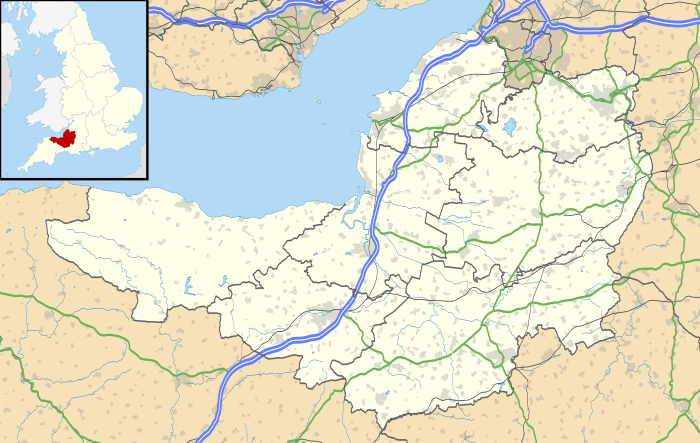Widcombe Manor House
| Widcombe Manor House | |
|---|---|
 | |
 Location within Somerset | |
| General information | |
| Town or city | Bath |
| Country | England |
| Coordinates | 51°22′27″N 2°20′52″W / 51.3742°N 2.3478°W |
| Completed | 1727 |
| Client | Philip Bennet |
Widcombe Manor is a grade I listed Georgian house in Widcombe, Bath, England, originally built in 1656[1] and then rebuilt in 1727 for Philip Bennet the local MP.[2] The crest of the Bennet family can be seen surmounting the two pedestals at the entrance gates.[3] The manor is located on Church Street adjacent to St Thomas à Beckett Church.
The house has a south-facing front which is in its original condition. In around 1850, the west front was altered and now includes a bay window and stone balconies at the first floor windows. The fountain in front of the house is Italian and thought to date from the 15th century. It was installed in its present position in the early twentieth century.[4] It is also Grade I listed. [5]
The house was home to Horace Annesley Vachell who based his novel Golden House on the property.[6]
From 1955, it was the home to the entrepreneur and inventor Jeremy Fry. Princess Margaret and Tony Armstrong-Jones were frequent visitors,[7][8] and it was the location of the 1972 Widcombe Manor Festival at which Hawkwind were scheduled to play.[9]
References
- ↑ "Widcombe Manor House and St. Thomas a Becket Church". Bath in Time. Dan Brown. Retrieved 23 November 2008.
- ↑ "Widcombe Manor House". Images of England. English Heritage. Retrieved 23 November 2008.
- ↑ Maurice Scott (1984). Discovering Widcombe and Lyncombe. ISBN 0-9520876-0-X.
- ↑ Maurice Scott (1984). Discovering Widcombe and Lyncombe. ISBN 0-9520876-0-X.
- ↑ Historic England. "Fountain at Widcombe Manor House (1394134)". National Heritage List for England. Retrieved 28 October 2014.
- ↑ Greenwood, Charles (1977). Famous houses of the West Country. Bath: Kingsmead Press. pp. 99–101. ISBN 978-0-901571-87-8.
- ↑ Jeremy Fry Obituary, The Times.
- ↑ Jeremy Fry Obituary, The Independent.
- ↑ Bath Free festivals 1972–1979.